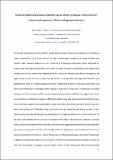Files in this item
Reciprocal allogrooming among unrelated Norway rats (Rattus norvegicus) is affected by previously received cooperative, affiliative and aggressive behaviours
Item metadata
| dc.contributor.author | Stieger, Binia | |
| dc.contributor.author | Schweinfurth, Manon K. | |
| dc.contributor.author | Taborsky, Michael | |
| dc.date.accessioned | 2019-04-16T10:30:11Z | |
| dc.date.available | 2019-04-16T10:30:11Z | |
| dc.date.issued | 2017-12 | |
| dc.identifier | 258579454 | |
| dc.identifier | c6faab36-f79f-465a-a6a9-292f2cbd7967 | |
| dc.identifier | 85037091383 | |
| dc.identifier.citation | Stieger , B , Schweinfurth , M K & Taborsky , M 2017 , ' Reciprocal allogrooming among unrelated Norway rats ( Rattus norvegicus ) is affected by previously received cooperative, affiliative and aggressive behaviours ' , Behavioral Ecology and Sociobiology , vol. 71 , 182 . https://doi.org/10.1007/s00265-017-2406-1 | en |
| dc.identifier.issn | 0340-5443 | |
| dc.identifier.other | ORCID: /0000-0003-2066-7892/work/56639214 | |
| dc.identifier.uri | https://hdl.handle.net/10023/17530 | |
| dc.description | Funding was provided by the Schweizerischer National Fonds (SNF—grant 31003A_156152 to MT). | en |
| dc.description.abstract | Reciprocity can generate stable levels of cooperation among unrelated social partners. If individuals interact repeatedly, costs of altruistic acts can be compensated through an exchange of donor and receiver roles. Frequent interactions are conducive to attaining evolutionarily stable reciprocal exchange. High interaction frequencies are typical for group members maintaining close relationships among one another, which may thereby facilitate reciprocity. Norway rats (Rattus norvegicus) are highly social animals that were experimentally shown to reciprocally exchange food donations and allogrooming. Here, we tested experimentally the relationship between reciprocal cooperation and other social behaviours exchanged within dyads of wild-type Norway rats. In particular, we asked whether and how interactions differing in quality (characterised by affiliative and aggressive behaviours) influence reciprocal exchanges of different social services. Our experiment involved three steps: Focal individuals experienced social partners that were either providing them with food or not, via a learnt stick-pulling task. Thereafter, they could either interact physically with these partners, or not. Subsequently, we induced allogrooming among them by applying saltwater to an inaccessible part of the body, and tested for the reciprocation of allogrooming. When individuals were allowed to interact freely, previously cooperative food providers exhibited more aggression towards focal individuals than previously uncooperative partners, which might reflect an attempt to coercively demand a return of food provisioning from focal rats. Higher frequencies of affiliative behaviours and lower frequencies of aggressive behaviours experienced during the unrestricted interaction phase tended to increase the focal rats’ propensity to engage in grooming the partner in the subsequent induced allogrooming phase. This suggests that affiliative and aggressive behaviours affect the allogrooming propensity of rats. In particular, higher frequencies of received aggression decreased the propensity to reciprocate previously received cooperation. We provide experimental evidence that rats are more likely to groom partners that pulled a stick to deliver food to them. Reciprocal exchange of allogrooming depends apparently on experienced cooperation, but also on the quality of the social relationship. | |
| dc.format.extent | 1373125 | |
| dc.language.iso | eng | |
| dc.relation.ispartof | Behavioral Ecology and Sociobiology | en |
| dc.subject | Norway rat | en |
| dc.subject | Cooperation | en |
| dc.subject | Reciprocal cooperation | en |
| dc.subject | Allogrooming | en |
| dc.subject | Food provisioning | en |
| dc.subject | Social bonds | en |
| dc.subject | BF Psychology | en |
| dc.subject | NDAS | en |
| dc.subject.lcc | BF | en |
| dc.title | Reciprocal allogrooming among unrelated Norway rats (Rattus norvegicus) is affected by previously received cooperative, affiliative and aggressive behaviours | en |
| dc.type | Journal article | en |
| dc.contributor.institution | University of St Andrews. School of Psychology and Neuroscience | en |
| dc.identifier.doi | https://doi.org/10.1007/s00265-017-2406-1 | |
| dc.description.status | Peer reviewed | en |
| dc.date.embargoedUntil | 2018-12-01 |
This item appears in the following Collection(s)
Items in the St Andrews Research Repository are protected by copyright, with all rights reserved, unless otherwise indicated.

